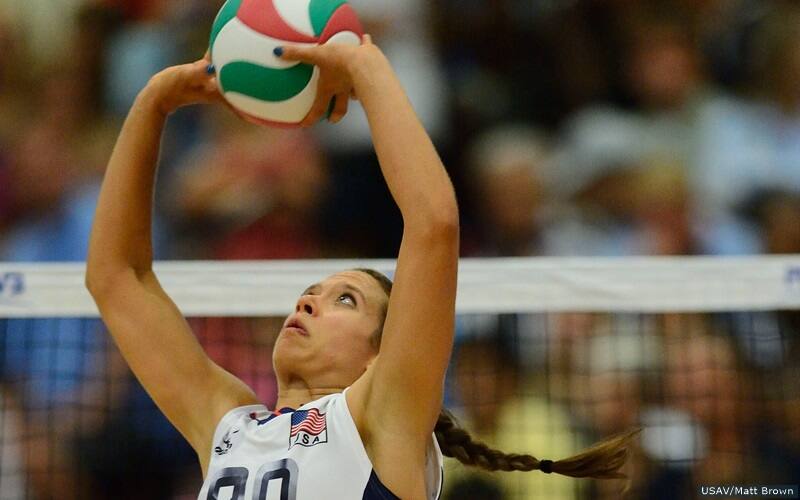
Volleyball players at all levels benefit from trusting the teammates surrounding them on the court at any given time. In addition to working together in practice and in matches, players can bolster each other’s confidence by practicing five simple rules.
As a hitter… call for the ball from your setter
Especially for a high-ball attack, whoever calls the ball the loudest wants it the most. This really makes a difference for a setter who has to run and chase a pass that is off the net. As the setter moves out of her comfort zone to focus on the ball, you have to understand as a hitter that your setter may lose sight of her hitter options. As a setter, if you cannot see your hitter very well, you must rely on your hearing.
One of the best ways to let a setter know where you are (i.e., where she needs to set the ball) and that you are ready to hit the ball is to yell for the ball LOUDLY! What she can’t rely on visually, she can rely on with audio – so you have to be loud and you have to let her know you want the ball. “Hey, Susie! Out here in 5!” or “Outside, I’m out here!” Say it like you mean it and the setter will be confident enough to give you the ball.
Call the ball early in serve receive
Calling the ball early is an excellent way to direct traffic on the court. Whether it looks like you are going to be served or not, talk about what you see the server doing. Watch and remember player tendencies. If the last time a server stepped up to the line she served the ball short – and it looks like she is going to do it again – be prepared to say it to your teammates: “Watch the short serve.” Do it for whatever you see, including deep serves, short serves, cross-court, or down the line. I do this all the time, especially when it is quiet and the referee has blown the whistle already.
I am sometimes the only person saying anything! I would rather warn my teammates about a possible short serve than be caught with my pants down by a surprise ace. What happens in this case? Some front-row players who may be nervous and not focused enough will key in better and take a step up toward the net just because you warned them about the possibility of a short serve. Get used to commenting about what you see during the pauses in play. Use that time to let the other team know you are prepared for anything. Eliminating the element of surprise instills confidence in your teammates.
Remind the hitters to cover
I have seen players become resentful for being reminded to “cover” by other teammates. As a result, here is a cool way of “reminding” your teammates without ruffling any feathers: Do it yourself. Then what usually happens is “monkey see, monkey do.” When you cover, say it loudly: “Cover!” and then do it. The coolest thing to a hitter is to hit a ball, be blocked and to see another teammate pick that ball up so that the hitter has a second chance to put that ball away. Instill confidence in your front-row hitters by always having their back in coverage.
Remind your blockers about hitting tendencies of opposing hitters
I include this specifically to introduce an interesting phenomenon I see in high school and club volleyball. If you see one of your front-row players jumping to block someone who doesn’t jump to hit, why block? Two hitters spend the energy to go up and attempt to block a ball that has an upward trajectory (going toward the ceiling and then having to come down) so it is a down ball that the block is never going to touch nine times out of 10. Why not spend that same energy transitioning back early into a down-ball defensive position and concentrating on making a precise, defensive dig so that you can run a fast offense? Make the other team pay for giving you a down ball. Treat it just like a free ball and simply practice increasing your transition speed.
Let the down-ball player hit the ball with no block, be courageous and let your defense gain confidence in digging that ball precisely. Another thing you can tell your blocker to do is instead of going up on a weak hitter or down-ball hitter, double up and help the middle blocker against the big front-row hitter. If you are in the back row and you see a blocker blocking a hitter that is never going to hit, let her know. Let that person hit with no block and either transition off or go block someone who deserves to be blocked.
Remind your setter where the big block is
Sometimes what is easiest for the setter to set may not be the smartest play for the team to make points. If your setter is setting the hitter that has the big block because maybe she hasn’t recognized who the weaker or smaller blockers are, be a BMOC (Big Man on Campus) and let your setter know where the smaller blocker is. Or where the weak blocker is. Or where the setter is. Tell her to set that way, not to keep setting in front of the really tall girl who is a good blocker. And if that means you do not get set, so be it. In the name of the team, get the point.
April Chapple is a former international indoor and beach volleyball professional.
